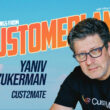In discussing well-being as it relates to food, Nik Modi, managing director at RBC Capital Markets, commented in a recent Food Institute Podcast that “treats” are not merely a vice to be approached with moderation, but rather a part of overall wellbeing – including the emotional components of wellness.
“It’s important for the industry to understand that there is this delineation,” said Modi. “Wellness can take many different forms.” Meaning, indulging in “unhealthy” foods can indeed be part of a “healthy” lifestyle. “It’s really about that mental escape,” he added.
And there’s a raft of scientific support that emotional wellness is a crucial ingredient in overall health and well-being.
By Hunter Thurman
But this brings up a common misconception within the food landscape: specifically that “indulgent” foods amount merely to those high in salt, fat, and/or carbs (the three cornerstones of craveability).
In reality, food and drink play a crucial role in helping people self-regulate. In other words, they’re crucial tools to help us control how we feel in response to the stresses of everyday life. From a psychological perspective, there are actually four types of indulgence; four mindsets with which consumers seek to create emotional well-being through food and drink. And marketers that embrace them will find rich new territory to explore via strategy and innovation.
Indulgence mindset 1: Rational
The rational ‘craving’ is satisfied by information and knowledge gathering. Appreciating the unique flavor of a certain provenance of tomato; evaluating the difference in cuts of meat; pairing the right wine and cheeses, and so on.
The satisfaction, and often premium price attributed to these ‘treats’ is based much more on appreciating the tangible aspects of the experience than the more stereotypical concept of “indulgence.”
Indulgence mindset 2: Tribal
The need to connect is another central driver of human behavior. Have you ever eaten when you’re not hungry, just because everyone else was? Sometimes the value of connection is the core of the ‘treat’ – shared meals, group dining, even sharing food content via social media.
The reward is social bonding, rather than the food itself. This ‘indulgence’ is unique from the others in that it’s truly altruistic. Whereas most human behavior is – like it or not – self-serving from the psychological perspective, this indulgence is about ingraining ourselves within our social tribes, and enjoying the benefits that come with belonging.
Indulgence mindset 3: Exploratory
Global cuisines, unique cooking efforts at home, and the like. Food is one of life’s purest conduits to exploration and discovery, and many consumer trends reflect this pursuit. In crafting innovation, for example, resist the urge to dismiss “indulgent” foods as merely gustatory in nature.
When we try new experiences, we discover new things about ourselves – and in this mindset, this personal exploration is the reward.
Indulgence mindset 4: Competitive
This used to be called ‘conspicuous consumption,’ in other words, showing off via consumption of premium foods (think the early days of Starbucks). And while this mindset does relate to impulsive behavior and access to premium experiences, there’s more to it.
Following gut instincts – like ordering dessert when dining out, or grabbing something indulgent in the grocery store – actually serves a deep emotional need and helps us to literally feel better. The ability – whether financial, physical, or emotional – to indulge in whatever one’s heart desires, is central to a feeling of empowerment and control.
So widen the aperture of your food innovation with the TRUE reasons consumers treat, indulge, or otherwise act in “irrational” ways – and serve wellness pursuits beyond what meets the eye.

Hunter Thurman is president of Alpha-Diver, the market research firm that applies neuroscience to more deeply understand marketplace behavior. The firm’s neuroscientists and strategists work with leading brands, retailers and the Wall Street analyst community to explain, measure, and predict consumer behavior. Clients include: Nestle, McDonald’s, Coca-Cola, and Kellogg’s, among dozens more.












